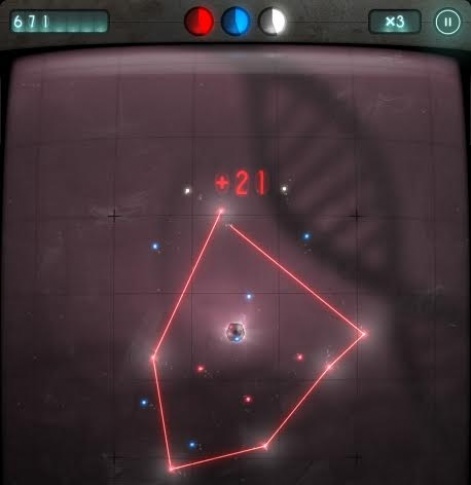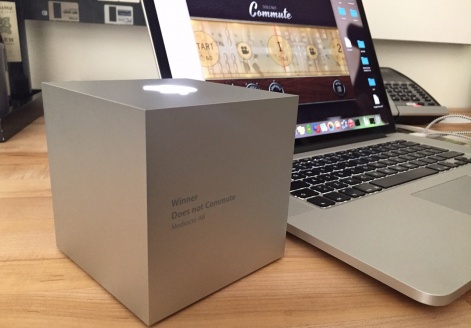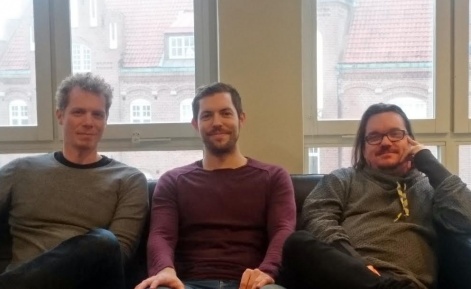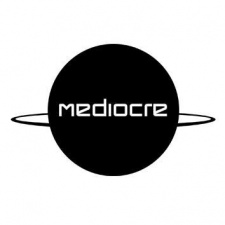When we met up with Mediocre's Henrik Johansson at the NASSCOM Game Developer's Conference in 2015, he hinted that the three-man studio was working on “a really small game.”
Fast-forward a few months, and Johansson - along with colleagues Dennis Gustavsson and Emil Bengtsson - are in London to show off a near-completed version of said game to Apple and Google.
Entitled DIRAC, after Paul Dirac the quantum physicist, the Swedish trio's latest is a hectic puzzle game which has you connecting molecules in various formations and shapes in order to maximise efficiency and score count.

A game of frantic plate-spinning (not literally) and on-the-fly tactics, a single misstep can dash your multiplier and, by extension, your hopes of success as the central core begins to spew forth molecules at an ever-faster pace.
A project that, by design, lacks the scope of previous Mediocre projects, it was the team's intention to develop and release a game in a much shorter time frame.
“It would be really nice to have it out before March,” Johansson tells us.
Testing, testing
We never work with TestFlight, mostly we like to observe people.Henrik Johansson
Indeed, DIRAC is obvously at a very advanced stage of development, but Mediocre remains keen to get it in as many hands as possible to gauge reactions.
Just days before we met, the team had hosted the last of what they call their “playtest parties” for the game, in which they get people to play and monitor them firsthand.
“The last time we used TestFlight was two or three years ago,” says Johansson.
“We never work with testing that way, mostly we like to observe people.”
The response, he reports, has been encouraging: “we had quite a few people who maybe aren't gamers getting really sucked into it.”
Meeting the gatekeepers
Arguably the most important playtests to date, however, would be the ones from Apple and Google - the entire reason for Mediocre's presence in London, with both platforms possessing great power to make or break an indie's fortunes.
“Apple only features at launch, so you basically need to show them the game beforehand - that's very important,” asserts Gustavsson.
“Apple are a bit more game design-focused - and more structured, I think. In general terms, Google might be a little more focused on the business side of things, which I think is no secret,” adds Johansson.

“Nobody tells you anything... you're not supposed to have any influence over the people making those kinds of decisions,” he goes on.
“All you can do is tell them what you're working on, so at least they'll know. And it has happened before that they've had suggestions for improvements - interface design and such.”
All in all, then, even if paying the platform-holders a pre-launch visit tips the odds ever so slightly in your favour, the process of being featured remains unpredictable.
“We've never, ever had any notification from the stores,” says Gustavsson.
Pay first, play later
Like previous Mediocre releases, DIRAC will be adopting the premium model. However, unlike Smash Hit and Does Not Commute, there won't be a free version to try before you buy.
This is purely down to the game's structure, offering endless high-score gameplay at a number of difficulty tiers.
Our next game will be more ambitious than DIRAC, but smaller than our other games.Henrik Johansson
“It's not different levels, but more like different levels of difficulty,” Johansson explains. “If you've already got easy and medium, and you pay for two additional [difficulties], that's not good value for money.”
With DIRAC expected to launch imminently, one could forgive the team a short break. However, never a studio to rest on its laurels, Mediocre is already toying with a concept that's likely to form its next game.
Understandably loath to reveal details so early, Johansson simply says “our ambition is to have something out in Summer.”
“It'll be a little bit more ambitious than DIRAC, but still smaller than our other games - somewhere in between.”
Strength in numbers
Besides experimenting with games of different sizes and ambitions, one of the factors allowing Mediocre to develop games more quickly is the addition of game designer Emil Bengtsson to the team.
Bengtsson joined Mediocre in September 2015, jumping ship from Sony Mobile, and thus DIRAC is the first game developed by the new-look, three-man Mediocre team.
"It's been really great," enthuses Bengtsson.
"It's kind of a cultural crash to move from a 150-person organisation to 3 - I spent a week walking around trying to find the HR department," he jokes.

"But I've known Henrik and Dennis for five years, so it's not really like starting anew."
Indeed, Johansson adds that Bengtsson added valuable input to game design sessions for Smash Hit and Does Not Commute prior to becoming an official team member, which was "the main reason we decided to work together."
"It's a big change for us, too," notes Johansson, "because it's been two people for five years and now we've got one more."
And, with two Mediocre games already in the offing for 2016, it looks like the change is for the better.
DIRAC is scheduled for release on the App Store and Google Play soon. For updates, follow @MediocreGames on Twitter.






















